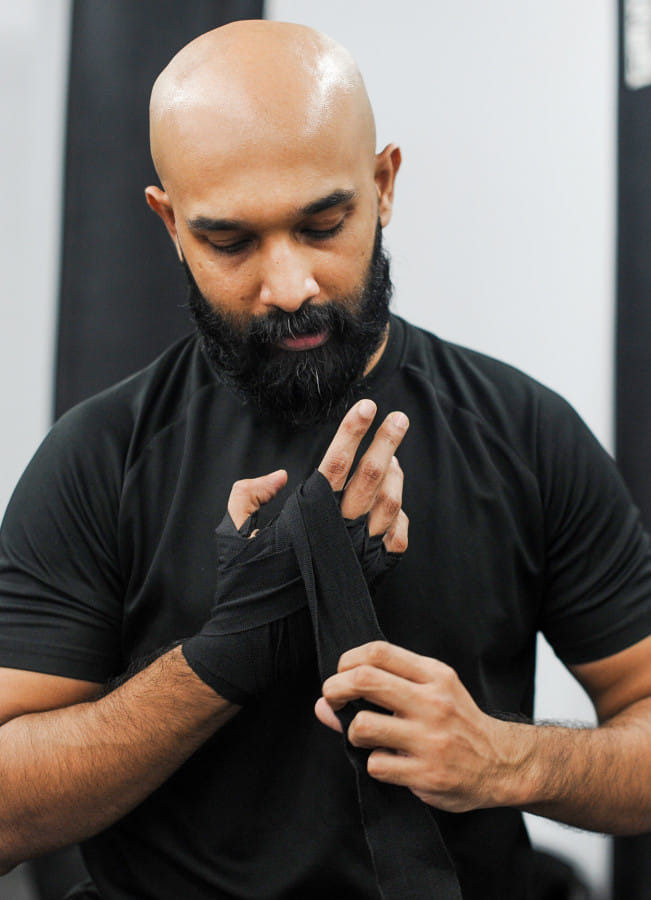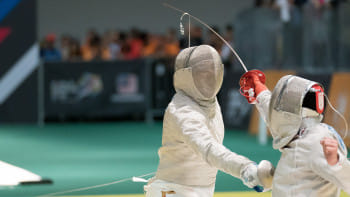Have you ever wanted a workout that challenges your body, sharpens your mind, and builds confidence beyond the gym? Kickboxing offers all this and more, combining fitness with self-defence. With studios popping up across Dhaka and beyond, kickboxing is becoming more than a trend – it's a lifestyle that prepares you for life's physical and mental challenges.
To explore the benefits of kickboxing and the reason for its growing popularity in Bangladesh, we recently spoke with Minhaz Remo – a certified strength and sports nutrition coach, a 2nd-degree black belt in ITF Taekwondo, and the Founder and Head Coach at Functional Performance.
A journey of strength and resilience
For some, the path to kickboxing is not just about fitness. It's equally about transforming adversity into strength – for example, the journey of Remo, whose story is one of resilience.
"I've always seen myself as a product of my experiences." Remo adds, "Bullying during my early years pushed me towards starting a wellness journey at 14. I was skinny and sensitive, making me a target, which deeply affected me. It was then that I vowed to never let myself be seen as weak again."
Driven by this promise, Minhaz Remo trained in Taekwondo, ultimately achieving national championship titles and representing Bangladesh in the sport. His journey did not stop there. Remo transitioned to kickboxing, searching for a more intense form of self-defence and competition.
"Kickboxing introduced me to sports science and corrective exercise therapies," he recalls. After suffering a serious wrist injury, Remo's time away from the mat allowed him to deepen his understanding of training, eventually developing his curriculum to help others overcome physical limitations.
"Now, I work with clients who suffer from chronic pain, using my knowledge to enhance their lives," he shares.
Remo's journey is just one example of how kickboxing goes beyond physical training – it fosters mental resilience and a commitment to growth.
"While I may not be a superhero, I use my skills to teach others how to defend themselves and regain their confidence. Kickboxing isn't just about fighting; it's about understanding, adapting, and thriving against all odds," Remo says.

The benefits
Kickboxing is a full-body workout that blends strength, agility, and endurance. Remo explains the multi-faceted benefits: "Kickboxing demands strength, conditioning, and precision – anything less is an insult to the combat sport itself. It challenges you to hone specific skills on a technical level."
Practising movements with precision builds hand-eye coordination, reflexes, and spatial awareness, pushing practitioners to remain mentally sharp. Moreover, it develops full-body functional fitness, helping to maintain balance, agility, and bone density as practitioners age. This makes it invaluable for long-term health and resilience.
In a society where personal safety is often a concern, kickboxing empowers individuals with practical self-defence skills, especially women.
"While training, you're not just working out; you're preparing your body to be strong, agile, and capable," Remo opines. The confidence gained from knowing how to defend oneself is a unique and lasting benefit.
A growing community
The enthusiasm for kickboxing in Bangladesh is fuelled by people like Remo and fellow practitioners who inspire others through their journeys.
Take Sumaiya Sayat Rubama for example, who explains, "Kickboxing helped me get into the discipline of pushing through discomforts when required to do physically challenging moves in repetition without stopping until a target I set for myself was hit. My reaction time started improving – I was aware of my mind-body connection and how to move in response to my surroundings."
Rubama's experience captures the core of kickboxing's appeal: it's a training regimen that's not only physically demanding but also deeply transformative on a mental level. As more people embrace kickboxing, studios across Dhaka have opened classes that cater to various experience levels.
These classes are attracting students, young professionals, and seasoned fitness enthusiasts who are inspired by the multifaceted benefits of the sport.
The future
The prospect of kickboxing in Bangladesh is bright, with ample opportunities for growth and professional development. A larger public demand for trained kickboxing coaches is likely as interest rises with increasing numbers of local trainers seeking international certifications to provide high-quality instruction. This is essential, as Minhaz Remo notes, to foster the sport's potential and promote safe, effective training.
Adding kickboxing to school and university physical education programmes could accelerate its growth, exposing students to the sport early on. Additionally, televising kickboxing events could inspire a broader national audience, positioning the sport as a staple in Bangladesh's fitness landscape.
Despite the positive growth, kickboxing faces challenges, including misconceptions about safety. Some may be sceptical about injury risks, but as Remo highlights, "Kickboxing is safe when practised under the guidance of a skilled coach and with proper equipment."
With a focus on safety and a commitment to spreading accurate information, kickboxing studios in Bangladesh can overcome these hurdles.
"The beauty of the sport is its ability to meet diverse fitness goals," Remo says. This flexibility is crucial as more people look for workouts that align with their lifestyles and needs. "Kickboxing is a comprehensive training regimen that prepares you for the challenges of life, both expected and unexpected," Minhaz Remo concludes.














Comments